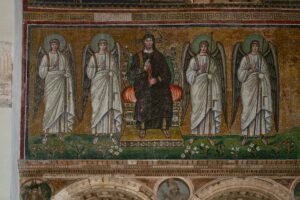XXXIVth Sunday of Ordinary Time, solemnity of Christ the King
Massimo Palombella

Today’s feast, which concludes the Liturgical Year, was instituted by Pope Pius XI on 11 December 1925 with the Encyclical ‘Quas Primas’.
Celebrating Christ ‘king’ means recognising in him a particular kingship that is identified with an ‘authoritativeness’. His being ‘king’ is steeped in strength and weakness. A strength that made Peter leave his small world of a fisherman to follow him, that made Zacchaeus come down from the sycamore tree and give half of his possessions to the poor, that made Matthew abandon the tax collectors’ bank. But, at the same time, there is in Jesus the ‘weakness’ of a God who was humiliated, slapped, spat on, crucified. A God who stopped and surrendered before our freedom.
His kingship, steeped in strength and weakness, is the model of our life, the true key to living ‘in abundance’. In fact, our true strength coincides with our weakness, loved and accepted. Only in this way, we can become credible, not by virtue of the roles we play, but by what and who we truly are.
The Communion antiphon for today’s celebration is taken from Psalm 28 (Ps 28:10b. 11b) with the following text: “Sedébit Dóminus Rex in aetérnum: Dóminus benedícet pópulo suo in pace” (The Lord will sit on his royal throne for ever; the Lord will bless his people in peace).
The attached music, in Gregorian Chant, is taken from the Gradual Triplex published in Solesmes in 1979. The music track can be found on YouTube where there is no indication of interpretation.
It is interesting to compare this antiphon of the Roman Rite with the Ambrosian Rite, where the same text is placed in the “Transitorium” which, in essence, coincides with the Communion antiphon of the aforementioned Roman Rite. As far as the Ambrosian Rite is concerned, the attached music, in Ambrosian Chant, is taken from the Antiphonale Missarum Iuxta Ritum Sanctæ Ecclesiæ Mediolanensis, published in Rome in 1935, which, to date, is the only “official” book of Ambrosian Chant for the Eucharistic Celebration.
The interpretation is by the Musical Chapel of the Duomo of Milan at the Celebration on the Solemnity of Christ the King on 13 November 2022.
A blessed Sunday and heartfelt greetings.